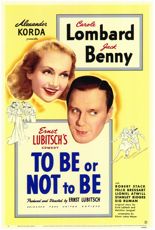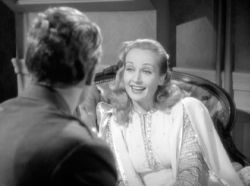
 Last year, Four Lions received praise as a daring, cutting edge satire of the terrorist boogeymen we’ve been trained to fear over the course of the past decade. The praise is more than deserved, but I couldn’t help but wonder how it would have been received if had been made and released in 2002, instead of 2010. Would the critics still have been able to find the humor in it, while the wounds of 9/11 were still so fresh?
Last year, Four Lions received praise as a daring, cutting edge satire of the terrorist boogeymen we’ve been trained to fear over the course of the past decade. The praise is more than deserved, but I couldn’t help but wonder how it would have been received if had been made and released in 2002, instead of 2010. Would the critics still have been able to find the humor in it, while the wounds of 9/11 were still so fresh?
Given the reception Ernst Lubitsch’s masterpiece, To Be or Not to Be, received upon its release, the answer is, “Probably not.” A satiric farce set in Nazi-occupied Poland, the film was made while WWII raged on and the public was still only becoming aware of the unimaginable horrors perpetuated by Hitler’s evil regime. The film was met with outrage, as critics and audiences were unprepared and unwilling to see the terrifying enemy they were fighting overseas portrayed as blithering buffoons in silly uniforms. Twenty-three years later, Hogan’s Heroes would start a six-season run on network television. Time heals everything.
 The film pairs TV legend Jack Benny (in what would be his defining film role) with the gorgeous Carole Lombard (who tragically died in a plane crash three months before its release) as Joseph and Maria Tura, Warsaw’s most beloved theatrical couple, whose company is forced to shut down following the Nazi invasion. Maria’s pre-invasion flirtation with a handsome Polish airman (Robert Stack) leads to their troupe using their acting skills to prevent a Nazi double agent from revealing the locations of the families of Poland’s exiled air force to the S.S.
The film pairs TV legend Jack Benny (in what would be his defining film role) with the gorgeous Carole Lombard (who tragically died in a plane crash three months before its release) as Joseph and Maria Tura, Warsaw’s most beloved theatrical couple, whose company is forced to shut down following the Nazi invasion. Maria’s pre-invasion flirtation with a handsome Polish airman (Robert Stack) leads to their troupe using their acting skills to prevent a Nazi double agent from revealing the locations of the families of Poland’s exiled air force to the S.S.
Viewed today, To Be or Not to Be is less transgressively outrageous as it is outrageously funny. Made by a master in his prime, it is required viewing for anyone who considers themselves a student of film comedy, and remains as fresh and relevant as anything you can expect to see in a theater today. —Allan Mott


 The story (with apologies to the word “story”) has Gooding brokenhearted after his girlfriend (Vivica A. Fox) dumps him when he barfs on her cleavage and proposes marriage. To cheer him up, his ultra-horny janitor pal Sanz convinces him to accompany him on a cruise to engage in lots of promiscuous sex with loose women. But unbeknownst to them, a vengeful travel agent (Will Ferrell, whose cameo is the film’s only saving grace, outside of Victoria Silvstedt’s purple panties) books them on an all-male, all-gay ship. Let the homophobia ensue!
The story (with apologies to the word “story”) has Gooding brokenhearted after his girlfriend (Vivica A. Fox) dumps him when he barfs on her cleavage and proposes marriage. To cheer him up, his ultra-horny janitor pal Sanz convinces him to accompany him on a cruise to engage in lots of promiscuous sex with loose women. But unbeknownst to them, a vengeful travel agent (Will Ferrell, whose cameo is the film’s only saving grace, outside of Victoria Silvstedt’s purple panties) books them on an all-male, all-gay ship. Let the homophobia ensue!
 That’s comprised mostly of one guy (George Diamond) who looks like Joe Mantegna’s second cousin. He’s trained in “subversive activities” and must find Prince Radolpho’s computer terminal. To do this, he’s given some gadgets that look assembled from various cast-off parts in Radio Shack’s bargain bin. This film’s Q rattles them off: “a rotational axis with combined sensor … and last but not least, your acid pen.” Replies our hero, “I hope it doesn’t leak in my pocket!”
That’s comprised mostly of one guy (George Diamond) who looks like Joe Mantegna’s second cousin. He’s trained in “subversive activities” and must find Prince Radolpho’s computer terminal. To do this, he’s given some gadgets that look assembled from various cast-off parts in Radio Shack’s bargain bin. This film’s Q rattles them off: “a rotational axis with combined sensor … and last but not least, your acid pen.” Replies our hero, “I hope it doesn’t leak in my pocket!”
 The two “stories” converge briefly when the agents come upon the croc in Steve’s possession and he mistakes them for poachers, putting them all on a collision course … with laughter!
The two “stories” converge briefly when the agents come upon the croc in Steve’s possession and he mistakes them for poachers, putting them all on a collision course … with laughter!
 Opposing him is cute blonde feminist Gloria Sternvirgin (Robyn Blythe, a former
Opposing him is cute blonde feminist Gloria Sternvirgin (Robyn Blythe, a former